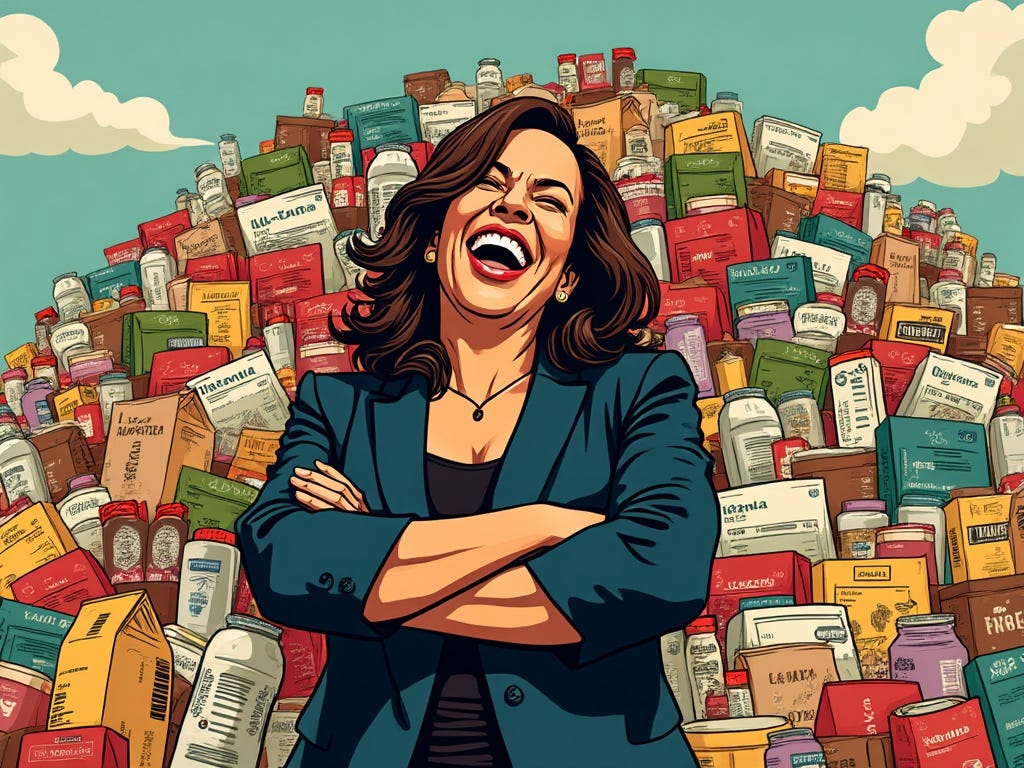Why Harris’s Price-Fixing Plan Will Backfire
Exposing the Hidden Costs of Government-Controlled Groceries
When it comes to basic economics, it doesn’t take a PhD to figure out that price-fixing groceries isn’t going to solve the problems in the U.S. economy. The root cause isn’t greedy capitalists with some sinister plot to gouge consumers. No, the real issue was created by flooding the economy with cash—cash that came with strings attached and consequences that we’re all feeling today.
Let’s rewind to where it all began: the CARES Act of 2020, the American Rescue Plan of 2021, the Infrastructure Investment and Jobs Act of 2021, and the ironically named “Inflation Reduction Act” from 2022. These bills pumped nearly $7 trillion into the economy, with little thought given to the runaway inflation that would follow. Any high school economics teacher could have told you what would be bound to happen. You can’t just flood the market with money and expect everything to stay the same. Instead prices go up, savings get diluted, and suddenly, that dollar in your pocket isn’t worth what it used to be.
This latest move by the DNC and the Harris/Walz ticket to fix grocery prices is nothing more than a weak attempt to distance themselves from the fiscal disaster they helped create, and it will be like using gasoline to put out a fire.
You can’t solve a problem unless you address its root cause. The issues we’re facing today stem from those ill-advised policies that sounded great on paper but were disastrous in practice. So now, in a desperate bid to appear like the saviors of the American family, Harris and her team want to dictate how much manufacturers can charge for basic necessities. Sounds noble, right? Well, a quick Google search will show you just how badly this strategy has failed in the past.
Not even a decade ago, in 2015, the darling of the left, NPR, published an exposé on the Venezuelan government’s attempt at price-fixing groceries. The result? Food shortages, rationing, and a booming black market. Inflation soared to 100% per year. So much for helping the average citizen.
But maybe that’s what they want–control of what you can buy, when you can buy it, and how much you can buy it for. Reminds me of the time when avowed “democratic” socialist Bernie Sanders told a reporter that “bread lines were a good thing.” No Bernie, waiting in line to buy groceries is not a good thing. Why do you think so many people are flooding our border?
Friends, we need to be smarter than this, and here’s how: First, recognize the deception for what it is–an attempt to buy votes. Second, do your own research on the cause and the solution. You may have to look beyond the reporting of CNN and MSNBC, although, in a strange turn of events, even the Washington Post wrote a negative opinion piece (first time?) on Harris price fixing idea. Perhaps Jeff Bezos, owner of Amazon and the WP, doesn’t want to be told how much he should charge for certain products!
The solution? I know many of you don’t want to hear it: Donald J. Trump
Let’s face it—Donald Trump is no saint, but at least he understands basic economic principles. He knows that energy independence is one key to driving down the cost of fuel, which in turn lowers the cost of transporting goods, which then starts to bring prices down. It’s a domino effect that actually works.
Balancing interest rates is also crucial to controlling inflation. The Fed can’t just run wild, raising rates without considering their impact on economic growth. Just ask anyone in their 70s or 80s—they’ll tell you what it was like under Jimmy Carter, when interest rates soared into double digits. It wasn’t pretty.
Trump also believes that a strong U.S. dollar is vital for controlling inflation. When the U.S. dollar is strong relative to other currencies, it means that each dollar can buy more foreign goods and services. This makes imports cheaper. It’s basic economics 101.
And lastly—obviously—the government needs to control its spending. Ronald Reagan nailed it back in 1981, just after Carter’s disastrous term: "In this present crisis, government is not the solution to our problem; government is the problem."



